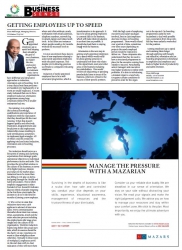Getting Employees up to Speed - Musa Makhunga, Managing Director, HR Matters (Pty) Ltd2016-08-24 Getting newly appointed employees up to speed and keeping them should be the goal of every business,
no matter the size, and sector, given high recruitment costs. Savvy organisations have deliberate and structured approaches to induction, orientation and on boarding. Yet it is true that at best these processes are handled very haphazardly or at worst are totally neglected. A recent study indicated that one in three employers lacked an orientation programme among large corporates whilst 67% of smaller enterprises had one. The tendency is to emphasize the technical knowledge, qualifications and experience of employees with the expectation that they should just hit the road running. When that doesn't happen quickly and effectively, frustration, disappointment and breakdown in the employment relationship ensues resulting in early terminations; sometimes in unpleasant legal wrangles. All of which could be avoided by applying tried and tested induction, orientation and on boarding processes. The induction should serve as a first point of setting and clarifying expectations from strategic goals, operational objectives to individual performance tactics and tasks. This provides the proverbial window to the culture of the business, in terms of its higher purpose, mission and values in the market place. Induction has to be more than just filling in HR take on forms and going through the Health and Safety procedures. This is where employee engagement is either founded or lost. Research indicates that two thirds of people resigning in the first three years make the decision to do so in the first few months of joining a new employer. It 'd be correct to state that induction starts once a job applicant is advised of interview dates. Every communication thereafter about interview venues, times, assessments, travel and the entire selection process including the employment offer stage gives insight into the culture of the organisation. Therefore induction begins long before the actual start date, which in essence should be the cherry on top Experience in worst in class workplaces show otherwise. Typically in these types of workplaces, employees arrive on the start date with no clear indication of who will meet them where and often without a ready workstation with email addresses, telephone numbers, network log in details, laptop and related work tools. In fact there are instances where people would go for months without the necessary tools to perform. It is not uncommon these days to hear of new employers refusing to assist newly appointed employees with relocation expenses. This despite SARS allowing generous tax breaks to companies relocating employees. Induction of newly appointed employees has to be a wellstructured programme, which is transformative in its approach. It has to be about getting employees to commit fully to the business, which will make them productive in as short time as possible. It should also lead them to staying longer with the business. Orientation is the next step in getting newly appointed employees up to speed which would really be about getting someone to understand how their role relates to the department, team and other areas of the business including key stakeholders. This would involve job shadowing or spending prescheduled time in areas of the business, which are critical to the success of their specific position. With the high costs of employing executives and salary packages involved, best in class employers also have in place on boarding programmes. These would extend over a period of time, sometimes over three years depending on projects the newly employed person would be expected to deliver on. These companies also understand that they do need to have a structured programme in place for the executive coming from outside to succeed. Parachuting senior managers and executives into higher positions is replete with problems. It is akin to introducing a donated organ to a new body; it requires certain conditions to prevail in order for the organ not to be rejected. On boarding programmes assist the new incumbent to deal with possible non-cooperation from those who felt they were unfairly overlooked for the position. Getting employees up to speed and retaining them longer through applying well thought out induction, orientation and on boarding programmes is beneficial to employers and employees and leads to higher levels of productivity and talent retention. Musa Makhunga Mobile: +27 83 2516704 musa@hrmatters.co.za www.hrmatters.co.za |
Getting Employees up to Speed - Musa Makhunga, Managing Director, HR Matters (Pty) Ltd
Copyright © 2025 KwaZulu-Natal Top Business
